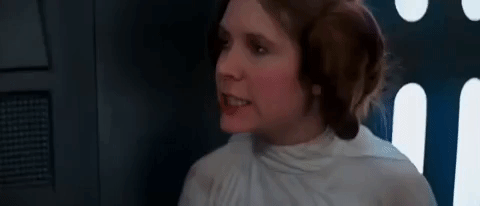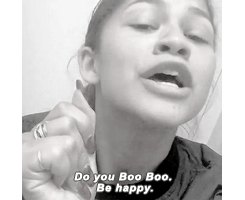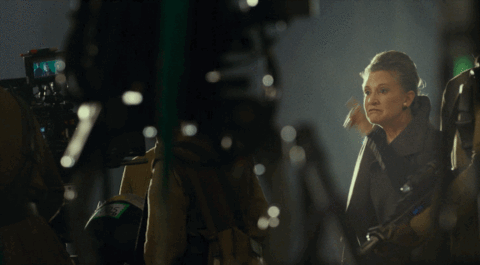Welcome to Books on GIF! You've found a book review newsletter that's smart, fun and peppered with animated GIFs. Subscribe here:
This Sunday's selection is 'No One Tells You This' by Glynnis MacNicol.

If you enjoy this review, click the ♥️ above or
Share
Apologies for not finishing this review on time last week, guys. If you follow me on Instagram, you know I was out of town. I know, I know, I should have had this finished long before I hit the road, but I didn’t: A coworker loaned me her advance review copy of ‘No One Tells You This’ after I told her I had read about it in The New York Times Book Review and figured a memoir about turning 40 and being childless would be right up my alley. It was, but I felt a range of emotions before I came to that conclusion. The first emotion was frustration. It was unclear at first why I should care about MacNicol’s backstory. For example, there’s a chapter about how she went on a press trip to Iceland and spent a day with an attractive tour guide. She tells us about her texting relationship with an unnamed celebrity dude known to us only by his 646 area code. She can afford to live in a Brooklyn Heights apartment working as a freelancer. She worked at the legendary Cedar Tavern (RIP) in the 1990s and made it sound really great. I thought, here we go again with another book by some New York writer person telling boring stories about how cool they are, like William Finnegan’s ho-hum ‘Barbarian Days’ about how he’s an awesome surfer guy. Her stories made me question myself: Did I waste my 20s by sitting in a Boston-area newsroom cubicle when I really should have been serving drinks or clearing tables at some cool bar? Would that have made me a more authentic writer? An artist, even? While I was reading this, I kept thinking: ‘Why am I reading this?’ Like:
A coworker loaned me her advance review copy of ‘No One Tells You This’ after I told her I had read about it in The New York Times Book Review and figured a memoir about turning 40 and being childless would be right up my alley. It was, but I felt a range of emotions before I came to that conclusion. The first emotion was frustration. It was unclear at first why I should care about MacNicol’s backstory. For example, there’s a chapter about how she went on a press trip to Iceland and spent a day with an attractive tour guide. She tells us about her texting relationship with an unnamed celebrity dude known to us only by his 646 area code. She can afford to live in a Brooklyn Heights apartment working as a freelancer. She worked at the legendary Cedar Tavern (RIP) in the 1990s and made it sound really great. I thought, here we go again with another book by some New York writer person telling boring stories about how cool they are, like William Finnegan’s ho-hum ‘Barbarian Days’ about how he’s an awesome surfer guy. Her stories made me question myself: Did I waste my 20s by sitting in a Boston-area newsroom cubicle when I really should have been serving drinks or clearing tables at some cool bar? Would that have made me a more authentic writer? An artist, even? While I was reading this, I kept thinking: ‘Why am I reading this?’ Like:  The second emotion was melancholy. MacNicol’s narrative has two threads. One involves the health decline and death of her mother. I’m very close to my mother, and MacNicol’s worry and grief — and love — for her mother moved me very deeply. (While I was reading this, I called my mom just to talk to her; I didn’t tell her why.) The other strand involves the months leading up to and following her 40th birthday. Turning 40 is a bummer, there’s no way around that. You’re not so young anymore; college was almost 20 years ago; life feels half over. It forces you to think, ‘Am I living my best life? Did I make a wrong turn somewhere to end up where I am now? Am I happy? Will I ever be?’ Two years into my 40s these questions still can get me down. When MacNicol wrote about spending her 40th birthday alone in Rockaway staring out at the ocean, I was right there with her, like:
The second emotion was melancholy. MacNicol’s narrative has two threads. One involves the health decline and death of her mother. I’m very close to my mother, and MacNicol’s worry and grief — and love — for her mother moved me very deeply. (While I was reading this, I called my mom just to talk to her; I didn’t tell her why.) The other strand involves the months leading up to and following her 40th birthday. Turning 40 is a bummer, there’s no way around that. You’re not so young anymore; college was almost 20 years ago; life feels half over. It forces you to think, ‘Am I living my best life? Did I make a wrong turn somewhere to end up where I am now? Am I happy? Will I ever be?’ Two years into my 40s these questions still can get me down. When MacNicol wrote about spending her 40th birthday alone in Rockaway staring out at the ocean, I was right there with her, like:
 The third emotion was empathy. When MacNicol was forced to assume a parental role and oversee her mother’s care, I thought: That could be me in the future. Also, as she dealt with family and friends getting married and having kids, and even strangers admonishing her that she still had ‘time’ to do both, while she stayed single, I wanted to speak into the book and tell her not to stress about the guilt trip the world lays on women. Society tells men they must be sexually potent in order to be real men. It tells women that they must be married, take their husband’s name, dump their careers and have children in order to be a real woman. All of this is garbage, but the pressure to conform is relentless. MacNicol’s stories reminded me about the times when I was chastised for Donna’s and my decision not to have kids. I remember a friend telling me that there comes a time in life when you have to do what’s expected. I remember a former boss asking me what was the point of our getting married if we weren’t planning to have children. I remember my grandmother telling me that I’d better have children because I didn’t want to die alone. I’ve thought about those moments many times over the years, but as I read MacNicol’s passage about struggling to get her sister’s kids up and dressed and then to drive them to school, it reaffirmed our decision on children, and I was like:
The third emotion was empathy. When MacNicol was forced to assume a parental role and oversee her mother’s care, I thought: That could be me in the future. Also, as she dealt with family and friends getting married and having kids, and even strangers admonishing her that she still had ‘time’ to do both, while she stayed single, I wanted to speak into the book and tell her not to stress about the guilt trip the world lays on women. Society tells men they must be sexually potent in order to be real men. It tells women that they must be married, take their husband’s name, dump their careers and have children in order to be a real woman. All of this is garbage, but the pressure to conform is relentless. MacNicol’s stories reminded me about the times when I was chastised for Donna’s and my decision not to have kids. I remember a friend telling me that there comes a time in life when you have to do what’s expected. I remember a former boss asking me what was the point of our getting married if we weren’t planning to have children. I remember my grandmother telling me that I’d better have children because I didn’t want to die alone. I’ve thought about those moments many times over the years, but as I read MacNicol’s passage about struggling to get her sister’s kids up and dressed and then to drive them to school, it reaffirmed our decision on children, and I was like:
 The fourth emotion was joy. In the end, ‘No One Tells You This’ put me in a good mood for several reasons. As you can see, I’ve used several Princess Leia GIFs, because she was a hero of MacNicol’s, and you all know ‘Star Wars’ makes me happy. Also, she avoided the first-I-did-this-then-I-did-that memoir style that long-time BoG readers know makes me crazy. I really liked how her story’s dual threads weave into a unique exploration of what it means to be a wife and a mother. Also, my frustration about her cool stories eventually was replaced by the warmth of remembering that everyone’s story is valid and interesting, and that you don’t have to be some heroic or famous person to have had experiences others can learn from. And lastly, I like the book’s message about living an independent life and doing what makes you happy instead of what society expects. Marriage and children are not some finish line, after which life is somehow complete. If you want to have those things, great, but make sure you’re doing it because it’s what you want. Because they don’t guarantee happiness. Your spouse, for example, could turn out to be a scoundrel. Your son could be an evil monster. Right, Princess Leia?
The fourth emotion was joy. In the end, ‘No One Tells You This’ put me in a good mood for several reasons. As you can see, I’ve used several Princess Leia GIFs, because she was a hero of MacNicol’s, and you all know ‘Star Wars’ makes me happy. Also, she avoided the first-I-did-this-then-I-did-that memoir style that long-time BoG readers know makes me crazy. I really liked how her story’s dual threads weave into a unique exploration of what it means to be a wife and a mother. Also, my frustration about her cool stories eventually was replaced by the warmth of remembering that everyone’s story is valid and interesting, and that you don’t have to be some heroic or famous person to have had experiences others can learn from. And lastly, I like the book’s message about living an independent life and doing what makes you happy instead of what society expects. Marriage and children are not some finish line, after which life is somehow complete. If you want to have those things, great, but make sure you’re doing it because it’s what you want. Because they don’t guarantee happiness. Your spouse, for example, could turn out to be a scoundrel. Your son could be an evil monster. Right, Princess Leia?
 This is what I think no one tells you: That it’s OK to be who you are, and that a woman can live an independent life and have it be just as rewarding and valid as a woman who chooses to get married and have kids. This passage* about MacNicol’s stay on a Wyoming ranch — where she spent some quiet time among nature, fished in streams and hung out with a hot cowboy — summed it up for me:
This is what I think no one tells you: That it’s OK to be who you are, and that a woman can live an independent life and have it be just as rewarding and valid as a woman who chooses to get married and have kids. This passage* about MacNicol’s stay on a Wyoming ranch — where she spent some quiet time among nature, fished in streams and hung out with a hot cowboy — summed it up for me:
I looked out the window. It was true. I was happy. Not excited, not exhilarated—but deeply satisfied. It was as though the immensity of the empty space around me had absorbed everything else, my sadness, and anxiety, and emotional exhaustion, and left me in only this present moment, driving back to the ranch. I whispered it out loud to myself. A declaration. I am happy.
This is an important reminder that life is short, and we must not waste time doing things that make us miserable. I thought of how Aristotle defined happiness as a marriage of action and reason, and from that we derive a sublime satisfaction. Zendaya puts it more succinctly: I think Aristotle would have liked this book. I think you’ll get a lot out of it, too.
I think Aristotle would have liked this book. I think you’ll get a lot out of it, too.
How it begins:
For someone who has always been bad at math, I have a weird fixation on numbers.
Take my mother’s death. Officially my mother died on March 20. A Monday. This is the date on her death certificate, and the date on her gravestone. This is also what the staff at the nursing home north of Toronto, where my mother had lived for the past twenty-six months, told my father when they called at seven that morning. My mother, they said, had died overnight.
I wanted more details, though. “Overnight” felt too nebulous. When my sister, Alexis, and I arrived the next morning to retrieve the last of my mother’s possessions, it was the first thing I inquired bout. Who exactly had found her? I asked the nursing attendant manning the staff desk that oversaw my mother’s wing, hoping this would lead to the specifics I was searching for.
The attendant was an older blond woman and she seemed puzzled by the question. “When a person is that ill,” she said, “we send someone in to see them every hour.” Behind her on the wall, in the frame reserved for pictures of recently departed residents, was a picture of my mother. IN LOVING MEMORY read the gold-plated plaque nailed to the bottom of the frame. It was a terrible picture, taken recently. My mother’s face was thin and frail, the confusion that had eaten up her mind apparent in the taut, angry expression. It made her look like a stranger. My mother, always so careful with her appearance, would have been horrified by the photo. She wasn’t even wearing lipstick.
My rating:
 'No One Tells You This' by Glynnis MacNicol was published by Simon & Schuster in 2018. 287 pages.
'No One Tells You This' by Glynnis MacNicol was published by Simon & Schuster in 2018. 287 pages.
In case you missed it: Books on GIF #89 featured ‘The Rent Collector’ by Camron Wright.
What's next: In two weeks you'll get a review of ‘Masks’ by Fumiko Enchi. Also in the queue are ‘The Vorrh’ by B. Catling, ‘No Matter How Much You Promise to Cook or Pay the Rent You Blew It Cauze Bill Bailey Ain’t Never Coming Home Again’ by Edgardo Vega Yunqué and ‘Unclaimed Baggage’ by Jen Doll, among others.
Shoot me an email if there’s a bestseller, a classic or a forgotten gem you want me to review. Thanks to Alex, Caroline, Howard and Tana for their recent recommendations.
Follow me on Twitter and Instagram.
Thanks for reading, and thanks especially to Donna for editing this review!
Until next time,
 MPV
MPV
* The excerpts here are taken from the review copy and may not exactly match the final version of the book.
Books on GIF newsletters with most ♥️s












